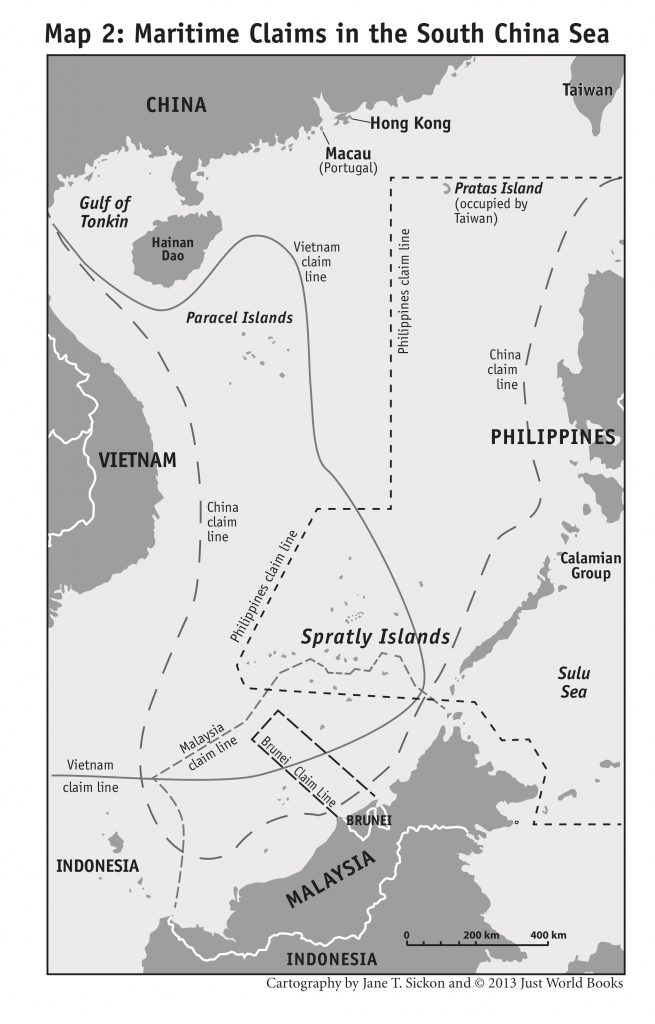“I believe South China Sea will be a testing ground for the future of the U.S.-China geopolitical relationship. Will it be a rivalry, strategic rivalry, or competition within a rule-based framework, or cooperation? It will be a test.”
These were the words with which Amb. He Yafei, a former Vice-Minister of Foreign Affairs in Beijing, summed up the importance of the ever-precarious situation in the South China Sea, a large maritime area in which China and five other littoral states have asserted numerous overlapping claims and within which the navy of the distant United States periodically conducts heavily armed “Freedom of Navigation” operations.
Amb. He spoke these words during a groundbreaking online “public dialogue” on US-China strategic issues that was held in mid-October, jointly sponsored by the Virginia-based non-profit Just World Educational and the Chongyang Institute for Financial Studies at Renmin University in Beijing. His interlocutor in the dialogue was Dr. Michael Swaine, Director of the East Asia Program at the Washington DC-based Quincy Institute for Responsible Statecraft. The video, audio, and transcript of the full, hour-long session can be accessed here.
Watch an excerpt from the talk:
The two panelists agreed on several key points—and disagreed on others.
Regarding the South China Sea, Amb. He noted that the talks that China and the ten members of the Association of South-East Asian Nations (ASEAN) have been conducting for several years to craft an agreed Code of Conduct (COC) for the SCS have shown some progress, particularly with the production of a “Single Draft Negotiating Text,” which was attained back in September 2018. However, he judged it uncertain whether, in the face of U.S. opposition to the COC project, the finally agreed COC could be attained any time soon.
“The U.S. in this case has played the role of peace breaker rather than a peace builder,” he said. “So we do hope the first step is for the U.S. to reverse its role. Honestly, peace in South China Sea serves the best interests of China, U.S. and ASEAN countries.”
China and the U.S. have, he said, “been working to build consensus and a crisis management mechanism to avoid direct conflict. I think this is quite urgent now. We need actionable crisis management mechanisms! However, as mounting U.S. military exercises and activities keep tension with China high in South China Sea, the effectiveness and reliability of the rules of behavior for the safety of the air and the maritime encounters established by the two will be working or workable? It will be a test later on… The absence of security cooperation mechanisms is the main pitfall of security challenges in the region.”
Amb. He said, “China has been saying, we need a dual-track approach, meaning [that in] a negotiation over sovereignty of islands and reefs… we may have a multilateral negotiation… More importantly, bilateral and multilateral communication and liaison mechanisms, including emergency hotlines, the security code of conduct, the rules of engagement will help better manage possible conflicts that seem to loom on the horizon.”
Dr. Swaine spoke about the South China Sea complex of issues after Amb. He. He started by welcoming much of what his Chinese counterpart had said, judging that, “Ambassador He put forth a very broad and comprehensive agenda of things that could be implemented to try to reduce the likelihood of tension and conflict in the South China Sea. And I endorse just about everything that he said in that regard. I hope those things are possible… I’m a little skeptical that that can happen, but I hope it will be possible.”
But he added some ideas about what he feels needs to happen in the short term: “I think that in both the South and the East China Seas, where China also has disputes with Japan, the United States needs to reinforce its longstanding position of neutrality in these disputes over largely uninhabited islands and their associated marine resources. It should more actively support peaceful negotiation among the claimants and mutually agreeable and realistic compromises in accordance with international law and fairness.”
The U.S. government should also, he said, “recognize that American involvement in those disputes over the past decade has at times actually exacerbated tension rather than promoting restraint on the part of China and other claimants.”
He expressed explicit agreement with Amb. He that, “the U.S. should engage in confidence building and demilitarization talks with Beijing and the other claimants. And these should cover all forms of military behavior, including Freedom of Navigation operations—but also including Chinese deployments on its artificial islands in the Spratly islands, in the South of the South China Sea. But even without such talks, I think the U.S. should in any event discuss reducing if not ceasing some of its Freedom of Navigation operations near disputed island territories, recognizing that such operations distort the original purpose of the freedom of navigation program, and they undermine the utility of U.S. military signaling, and they heighten the risk of U.S. military involvement in some sort of destabilizing crises.”
The American specialist said that China also “needs to do several things it hasn’t done, as well. I think it needs to reaffirm unambiguously that it will never employ force to remove other claimants from disputed islands and reefs, unless others were to attack it first. And that it is committed to finding a peaceful, mutually acceptable solution to its disputes. China also needs to stop harassing its neighbors in waters where China has no nearby territorial sea or exclusive economic zone claims, and yet falls within the nine-dash line.”
He called on China to “[restrain] its behavior and not engage in exclusive approaches towards fishing rights and other things. There is no basis whatsoever in international law to justify a nation excluding other nations from areas where it only claims a historical right to fish or exploit marine resources. These are supposed to be shared resources, not exclusive!”
Overall, he said, he hopes “that China recognizes that an attempt to assert exclusive control over the South China Sea, its territories and waters, will hugely damage its interests and could spark a conflict with the United States. So we have to avoid that. And I hope that China recognizes that the United States needs to be in some sense a party in discussing how you can reduce tension in that region and should engage in the kind of discussions that Ambassador He has presented.”


